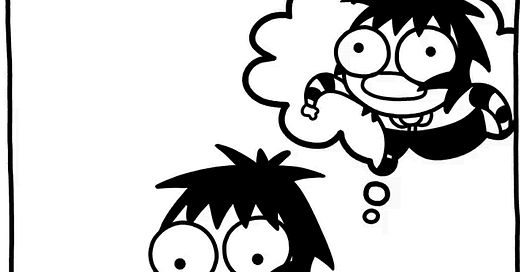Let's be honest, making peace with weight gain is very challenging. Whether you are a person who has recovered from an eating disorder or someone who has never struggled with one, accepting weight gain remains a challenge: especially in today's society where weight loss is praised and envied, while weight gain is looked down on and associated with ''letting oneself go''.
There are different reactions to weight gain, some start their restrictive diet right on the spot, others work out a little longer in the following days. Me on the other hand, the moment I feel like I have gained weight, I want to eat more! I feel so disappointed in my body:
‘‘But I did not buy chips at home! I did not eat the cake I craved! And I still gained weight?!’’
It feels so unfair.
‘‘I thought we were on the same side!’’, I want to say to my body. I am tempted by my inner voice;
‘‘Go buy the chips you refrained yourself from buying and eat the whole pack!’’
I have thoughts about eating the foods that I've missed out on, despite the fact that I did not eat them at the time just because I did not want to.
‘‘Go get the cake you saw yesterday on the bakery's window’’
‘‘Remember the chocolate bar you held yourself back from eating this morning? Why don't you go ahead and inhale the whole bar? It does not matter, you gain weight either way!’’
It is not wrong nor problematic to such foods. But they become problematic because; one - After seeing that I have gained weight, I want to eat them all at once and two - I do it to implicitly to punish my body:
‘‘I did what had to be done (held you back from eating what you wanted) and you still worked against me by gaining weight!’’.
The moment I catch myself taking a punitive stance towards my body, I stop and take a deep breath. I question how being this harsh will help me. Will it help me? Or, will it make me feel worse? The answer is almost always the same: ‘‘It will make me feel way worse than I am feeling right now’’. Here is what I do next:
1) I don't let it escalate.
I intervene right there and then. If I feel like my punitive inner voice is too strong to stop, I imagine how things will go, how I will feel if I let the voice go on and on. I close my eyes and visualize what will happen if I do not intervene: I will go into a downward spiral of ‘‘You have gained weight – you should go on a diet!’’ then ‘‘Eat everything in sight! Start tomorrow’’, then once again ‘‘You gained weight, this is not working, restrict even more!’’. Then the downward spiral will be the beginning of the binging and dieting cycle. I certainly do not want to go back to being stuck between two extremes.
2) I write down what my inner voice is tells me and I give the voice a name.
When I talk to myself in a cruel manner, it is not exactly me talking. The emotional state that I am in causes me to speak this harshly with myself. I do not speak to myself so critically when I am feeling good about myself, the critical voice becomes apparent only in emotionally charged situations. I like to think of the critical voice as a part of myself, a mode, as they call it in Schema Therapy (If you would like to read more about modes in eating disorders, you can check out my Schema Modes in Eating Disorders entry). The whole function of this mode is to kick a man when he's down. It is a dysfunctional mode, thus it is crucial to externalize this critical voice. I give it a name, I say that she is acting up again. I separate her from myself. Then I play the devil's advocate: I argue back with the voice using every argument I can think of, realistic or not. After a while, the critical voice inevitably runs out of arguments to put me down and I feel much better.
3) I wear comfortable clothes and avoid mirrors.
When I see that I have gained weight, I usually see myself even bigger in the mirror than I am. If I get one glance at my reflection in the mirror, I may fall into the trap and do body checks. I simply keep myself busy and quickly walk past the dressing mirror.
In the experience of gaining weight, we don't only ''see'' that we have gained weight, but we also ''feel'' the weight gain all over our body. Weight gain is a tactile experience. If I push myself to fit in my skinny jeans in smaller size, I will be constantly reminded of the feeling of being squeezed, because the jeans will stimulate me tactually. I will be thinking about my size both consciously and unconsciously. Thus, I prefer to wear clothes that I feel comfortable in, rather than clothes that make me self-conscious.
These are the three things I do, when I'm dealing with weight gain. I specifically used the word ''dealing'' when discussing weight gain, because even though I have recovered, I still find the word ''acceptance'' too strong for me here and I have made peace with that. I do not believe that we necessarily need to ''accept'' weight gain, but we have to learn to sit through the uncomfortable feeling it causes us, instead of disrupting the natural course of our bodies by dieting, binge eating and purging.







